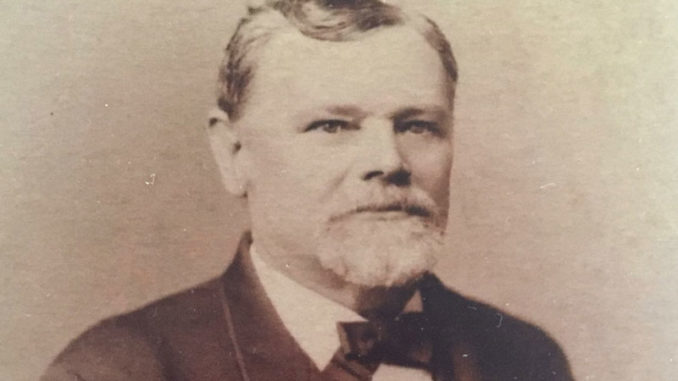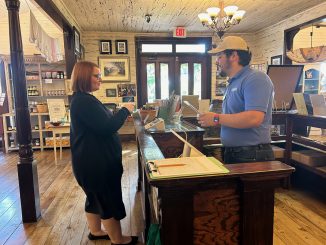
Former governor, fought for civil rights
The man for whom Hahnville is named is noteworthy for far more than that.
Born in Germany, Michael Hahn came to the United States as an infant in the 1830s and after coming of age, he quickly made his mark. Hahn was elected the 19th Governor of Louisiana and the first German-born governor in U.S. history, served as Congressman and Senator, directed the New Orleans city school board and founded three newspapers — including the then-St. Charles Herald, now the Herald-Guide.
After retiring to live in St. Charles Parish, he established the then-village of Hahnville.
Perhaps most notable about his political career is the progressive stance he took regarding race and slavery, fighting for emancipation of slaves and for the voting rights of African Americans during the Civil War era.
“He was very much a progressive individual,” said Rita Carlson of the St. Charles Museum & Historical Association. “He didn’t have a lot of money, but he was very generous with his land. He gave land to establish a school and a church (for African Americans). He truly believed slavery was a terrible thing.
“I often thought that when they took down all of these statues, they probably should have put one up of Michael Hahn,” Carlson added. “He was so passionate about everyone being equal.”
Hahn was the last child born to his family in Klingenmunster, Palatinate in southwestern Germany. He arrived in New York City after immigrating with his widowed mother and four siblings, eventually moving to Texas before settling in New Orleans. Just a year after their 1840 New Orleans arrival, his mother passed away from yellow fever, and Hahn was raised by his siblings from there. A decade later, he earned a law degree from Tulane and worked for then-Louisiana Attorney General Christian Roselius.
In his early 20s, he was elected to the New Orleans city school board and became its director. Not long after that, he became a vocal opponent of secession and began backing the Union. In 1862, he was elected as a U.S. Representative from the state’s second congressional district and was one of two Louisiana representatives to be seated in Congress. That afforded him the opportunity to form a bond with then-President Abraham Lincoln.
Hahn became Governor of Union-held Louisiana in 1864, earning 54 percent of the vote. He implemented an aggressive agenda, aiming to oversee the Reconstruction of Louisiana as a state where former slaves were citizens with civil rights. But many of his goals were opposed and ultimately blocked. The assassination of Abraham Lincoln in 1865 proved a major setback as well, as it at the time ended Louisiana’s bid to be reinstated by the Union and stopped Hahn from being seated as Senator.
“His claim as a senator was never pressed after that,” Carlson noted. “You would still consider him a U.S. Senator, but Lincoln’s assassination kept him from going forward with it.”
Two years after Lincoln was shot, Hahn also suffered serious wounds after he was shot in New Orleans in 1866.
He survived and retired six years later to live in St. Charles Parish, soon establishing Hahnville and also his second of three newspapers, the St. Charles Herald.
Though he retired in 1872, he didn’t exactly slow down. Hahn served in the state legislature, as Chairman of the Judiciary Committee, as Speaker of the House, as Superintendent of the U.S. Mint in New Orleans and as Judge of the 26th state judicial district, which included St. Charles Parish.
Hahn passed away due to heart complications in 1886.
Carlson said while Hahn accomplished so many things in his life, to many his name is relatively unknown. Even in the town he was born, people were relatively late to learn of his accomplishments.
“(The Historic New Orleans Collection) received a letter from the town, and they apparently had just discovered that someone born in their tiny town became a governor, a judge and a senator,” Carlson said. “They wanted to set up a museum.”
His anonymity for a long time extended to some of his descendants, who did not know of their relation to Hahn because he wasn’t recognized by some family members in his lineage who disagreed with his stance.
“They didn’t know that a generation later would not only be very interested, but proud to have an uncle like that,” Carlson said. “He was very scholarly, very intelligent and really way, way ahead of his time.”





He was Jewish which explains a lot of where he got the privilege of attending college and advancing into government within a short time. The fact that he was the first Jewish Governor in the USA speaks volumes. Wikipedia writes that he died poor. I find that hard to believe.
Back in those days, they did not get the money today’s politicians do. There were many leaders in those days who did die very close, if not, penniless. To make your statement, if gives the opinion, that you are not very old or mature. Just saying…
My research along with many others have nothing about Hahn being shot, but instead was shot at, never hit by a bullet, however was hit in the head with a brick on July 30, 1866.